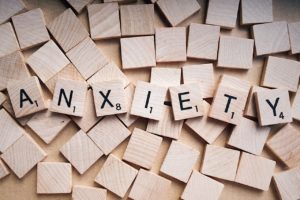Are the incessant demands of work, school or family taking their toll on you? Are financial issues, illness, or other problems causing so much stress that your mental health is negatively affected? Do you often feel tense and even have physical symptoms, such a racing heart or trouble breathing? Do you wonder if you’re having anxiety attacks?
We need to give the same priority to tending to our psychological well-being as we do to keeping our physical bodies healthy. Anxiety is a prevalent mental health issue, but it can be debilitating and overwhelming. It’s essential that we recognize what anxiety is, and are equipped to cope with it.
According to the Anxiety and Depression Association of America, “Anxiety disorders are the most common psychiatric illnesses affecting children and adults. An estimated 44 million American adults suffer from anxiety disorders. Yet only about one-third of those suffering from an anxiety disorder receive treatment even though the disorders are highly treatable.”
Are anxiety and worry the same thing?
 Worry and anxiety are terms that are sometimes used interchangeably, but they aren’t quite the same thing. “Worry” means negative and repetitive thoughts and emotions about some sort of threat or challenge that one may not be able to deal with.
Worry and anxiety are terms that are sometimes used interchangeably, but they aren’t quite the same thing. “Worry” means negative and repetitive thoughts and emotions about some sort of threat or challenge that one may not be able to deal with.
“Anxiety,” according to the American Psychological Association, “is emotion characterized by feelings of tension, worried thoughts and physical changes like increased blood pressure.”
We worry about a specific problem or challenge – we can name the issue that is worrying us, and it’s usually a viable threat. For instance, a student may worry that he didn’t study enough for the exam tomorrow. A parent may worry about their child’s high fever. On the other hand, feelings of anxiety usually have to do with vague concerns that may be hard to define.
Because worry usually has to do with specific, realistic problems, we can attempt to do something about the thing that we’re worrying about. For instance, the student worrying about the exam can grab his books and review with a classmate. The parent with the feverish child can call the doctor. By contrast, the reason one is suffering from anxiety is much less obvious, so it’s harder to “fix” it.
We all feel anxiety from time to time, but for most of us, it doesn’t linger. Unfortunately, some people have ongoing anxiety issues even when they’re not really experiencing stressful situations. Constant and irrational worry, fear and tension overwhelm them and disrupt their daily activities and relationships. If this describes you, you may have an anxiety disorder.
Is this an anxiety attack or a panic attack?
Some people with an anxiety disorder have what’s known as anxiety attacks. An anxiety attack is not the same thing as a panic attack, although they may share several physical symptoms, such as a racing heartbeat, shortness of breath, sweating, trembling, dizziness and upset stomach.
Panic attacks come on suddenly, usually without warning or a specific trigger. An anxiety attack builds up over a period of time – days or even weeks – in response to a specific stressor or threat. A panic attack is more acute and severe than an anxiety attack, but it’s also over quickly, within ten minutes or so.
You don’t have to have a panic disorder to have a panic attack, but anxiety attacks are usually connected to some type of anxiety disorder. Anxiety may manifest with differing symptoms, depending on the kind of anxiety disorder, as well as the person afflicted by it.
What are the symptoms of an anxiety attack?
Edmund J. Bourne, Ph.D. lists the ten most prevalent symptoms of anxiety attacks in The Anxiety and Phobia Workbook. Symptoms of an anxiety attack include:
- Muscle tension
- Sleep disruption
- Problems focusing
- Tiredness
- Nervousness, unease
- Short temper, easily angered by small things
- Pronounced startle response
- Faster heart rate
- Feeling that you can’t get enough air in your lungs
- Feeling faint or unsteady
Understanding the indicators of an anxiety attack is essential in determining whether or not you have a significant anxiety problem.
How do I cope with anxiety symptoms?
1. Know yourself
 Be aware of how your body, brain, and emotions react to specific circumstances. What seems to be triggering the anxiety? What seems to help calm you down? When you understand the physical symptoms that emerge when you are anxious, you can take steps to apply learned coping skills.
Be aware of how your body, brain, and emotions react to specific circumstances. What seems to be triggering the anxiety? What seems to help calm you down? When you understand the physical symptoms that emerge when you are anxious, you can take steps to apply learned coping skills.
2. Know the ways you are nurturing anxiety.
We contribute to our own anxiety through a number of ways, including false beliefs about ourselves, failure to express our feelings and opinions, not asserting ourselves, neglecting our needs, and consuming too much coffee or other stimulants.
One of the most significant ways we nurture anxiety is through “anxious self-talk.” Self-talk is our internal dialogue – the way we talk (maybe out loud or maybe silently) to ourselves throughout the day. We all have conversations with ourselves, more than we realize, and these self-conversations can be critical in either nurturing anxiety or nipping it in the bud.
Let’s say you get up in the morning, step on the scale, and groan, “I’m such an idiot! Why did I eat all those carbs yesterday? I’m going to give myself diabetes! And look at this belly – all bloated! What am I going to wear today so I don’t look like a slob?”
You drive to work, thinking, “Ugh…Monday! I don’t even want to think about what’s waiting for me on my desk! Why didn’t Phil give any feedback on that report I turned in last Thursday? He must not have liked it! What did I do wrong on that report? And what’s this noise my car is making? Oh, please don’t tell me I’m going to have to cough up for another expensive repair!”
You haven’t even been up two hours, and already your self-conversations are full of negativity, self-condemnation, doubt, and worry. Do you see how this could ramp up your anxiety level?
Be intentional about changing your self-talk! Switch to a positive dialogue, with self-affirmation. Pay attention to the path your thoughts and internal dialog are taking, and encourage and empower yourself through your self-conversations. You will be amazed at how anxiety is replaced by peace and a calm confidence.
3. Know the factors that contribute to your anxiety.
 Although many people struggle with anxiety, the triggers vary from person to person. Different anxiety disorders arise from a number of factors, which can include hereditary and biological influences, childhood experiences, traumatic events, prolonged and extreme stress, and even our own bad habits of nurturing anxiety, as discussed above.
Although many people struggle with anxiety, the triggers vary from person to person. Different anxiety disorders arise from a number of factors, which can include hereditary and biological influences, childhood experiences, traumatic events, prolonged and extreme stress, and even our own bad habits of nurturing anxiety, as discussed above.
If you can identify the factor(s) that gave birth to your anxiety, this alone can give you insight into what your likely triggers will be and help you to map out a strategy for coping with anxiety and avoiding anxiety and panic attacks.
4. Know the three levels of intervention for anxiety.
The Anxiety and Phobia Workbook gives three levels of intervention for recovering from anxiety:
- Reduce physical reactions to stressors.
This is the way your body responds to an anxiety trigger – such as a fast heart rate, sweating, trembling, throat tightening, and so forth. The goal is to minimize these sorts of reactions.
- Eliminate avoidance behavior.
These are behaviors that you might do to avoid the thing that causes you anxiety. For example, if you’re afraid of getting an infection, you might obsessively wash your hands. If something outside causes you anxiety, you might stay shut up indoors. The problem is that avoidance behaviors make matters worse and actually increase anxiety.
- Change subjective interpretations or self-talk.
As we discussed above, our internal dialogue can increase or decrease anxiety, based on whether it’s negative or positive in nature.
5. Know coping skills that work for you.
 You may think that you don’t have much control over your anxiety, but you actually do. One way you can take control is to equip yourself with effective coping skills. Coping skills are activities which help to diminish negative emotions, aide in processing through challenges, and take your mind off of things that cause you anxiety. Of course, it’s important to make use of healthy coping skills, rather than coping in a negative way that leads to more problems – such as through substance abuse.
You may think that you don’t have much control over your anxiety, but you actually do. One way you can take control is to equip yourself with effective coping skills. Coping skills are activities which help to diminish negative emotions, aide in processing through challenges, and take your mind off of things that cause you anxiety. Of course, it’s important to make use of healthy coping skills, rather than coping in a negative way that leads to more problems – such as through substance abuse.
The coping skills you choose depend on your personal interests and skills, and what is most effective in reducing anxiety. Physical exercise is a great way to release stress, with the added benefit of helping you become healthier. Some find that relaxing hobbies are helpful – such as reading, painting, or sewing. Laughter is always good for the soul, so watching funny movies or TV shows may lift you out of an anxious mood. Sometimes the empowerment that comes from engaging in self-defense courses work wonders.
Will counseling for anxiety help?
Anxiety symptoms are not always a bad thing. It’s actually part of the “fight or flight” response that is our natural response to threats and frightening events. Anxiety can help us avoid danger and motivate us to accomplish things.
However, if anxiety is becoming a persistent force in your life, it can interfere with your daily activities, and become overwhelming and debilitating. That’s why coping skills are important, as they give you the outlet you need. Many people suffering from anxiety also need professional help. Talk therapy is a successful tool for reducing anxiety, giving you the support you need, and empowering you with the tools to defeat this disorder.
Counseling can help you to confront your fears, control them, and be free from their control over your life. We are happy to come alongside you, walk you through your struggles with anxiety, and help you take charge of your life. Please don’t hesitate to contact us to set up an appointment.
“Rain of Light”, Courtesy of Christopher Campbell, Unsplash.com, CC0 License; “Stressed Out”, Courtesy of Ayo Ogunseinde, Unsplash.com, CC0 License; “Feeling Down,” courtesy of Patrick Denker, Flickr CreativeCommons (CC BY 2.0); “Anxiety,” courtesy of wokandapix, pixabay.com, CC0 Public Domain License
-
Kate Motaung: Curator
Kate Motaung is the Senior Writer, Editor, and Content Manager for a multi-state company. She is the author of several books including Letters to Grief, 101 Prayers for Comfort in Difficult Times, and A Place to Land: A Story of Longing and Belonging...





